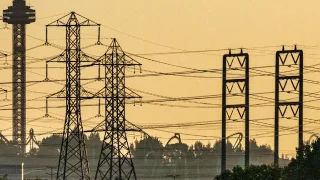
The Centre for Independent Studies (CIS) welcomes the opportunity to respond to the DCCEEW’s consultation paper on proposed amendments to provide the AEMO and Industry Participants a longer-term authorisation from competition provisions in the Competition and Consumer Act 2010 (CCA) to manage power system security and reliability risks associated with System Works.
The CIS is a leading independent public policy think tank in Australia. It has been a strong advocate for free markets and limited government for more than 40 years. The CIS is independent and non-partisan in both its funding and research, does no commissioned research nor takes any government money to support its public policy work.
a) How will the public benefits and risks to competition from a longer-term authorisation change over time?
The CIS is concerned that authorisation is being made more permanent, and believes it is likely to result in decreasing public benefits and greater risks to competition over time. This is evident from prior authorisations from the ACCC. While previous rounds of authorisation were made on the grounds of existing crises (as outlined below), the most recent determination was not, and was initially denied. This indicates that public benefits are marginal in comparison to, the risks to competition.
The authorisation was first given under the exceptional circumstances of COVID-19 and its impact on global supply chains. Both the circumstance (COVID-19) and the direct crisis (for supply chains) were actual and immediate. The second authorisation was given because of concerns over the Ukraine conflict, flooding, and extreme weather conditions. Again, both the circumstances and direct crisis were actual and immediate.
The grounds for the most recent authorisation were neither of these things. The authorisation was given to help participants handle “unanticipated future shocks” and “complex System Works coordination issues associated with the energy transition”. These are potential situations and potential crises: much weaker grounds for permitting even temporary coordination between participants, much less permanent and ongoing coordination.
These concerns are clearly borne out by the fact that the most recent draft determination from the ACCC denied authorisation to AEMO and Participants. This decision was reversed in the Final Determination, but only following AEMO halving the requested authorisation length from 3 years to 18 months, and with significant additional reporting requirements.
b) For what period should this longer-term authorisation be provided and why?
A longer-term authorisation should not be given. The ongoing accountability to the ACCC, the possibility of denying further authorisation, and authorisation with additional conditions, are appropriate features of the current process.
However, if such a longer-term authorisation is going to be provided, it should last for 18 months, per the most recent approval from the ACCC, because:
- Shorter periods reduce the level of detriment. Indeed, the ACCC only approved the most recent authorisation once AEMO requested an 18-month authorisation, having denied authorisation for a 3-year period in their Draft Determination. Also, as noted by the ACCC in their most recent determination: “The ACCC considers that the shorter period for which authorisation is sought reduces the likely level of detriment.”
- AEMO and industry participants should be required to show how the benefits to consumers justify an exception from the Competition and Consumer Act 2010 (CCA). Along with the self-evident reason that exceptions to the law should remain exceptional, the participants in question operate in a complex industry that is difficult for consumers to understand and advocate for their own interests within.
- The market conditions under which participants operate is changing rapidly, and the quantification of benefits to consumers of coordination will change more quickly than in established industries where regulation is relatively stable. For example, the National Electricity Rules (NER) are currently version 209; having undergone eight changes since the most recent authorisation was given in December 2023, all eight of which happened within three months.
c) If the authorisation were to have an end-date, should there be an option to extend this authorisation?
The possibility that further authorisation is either denied or given with additional conditions are both appropriate features of the current process and should be retained where possible.
As noted above in Question b, point (1): AEMO and industry participants should be required to show that the benefits to consumers justify an exception from the CCA. The best way to ensure this happens with a longer authorisation is to set an end-date that cannot be extended; requiring AEMO, participants, and government to justify another such authorisation.
Regarding Question c(a): there should be a review process to ensure any extension is appropriate, and that the review process should — in light of the longer periods of authorisation — meet the minimum standards of the existing ACCC reviews, both in rigour and public consultation.
d) Referring Appendix A as an initial reference point, what conditions should be placed on the authorisation and should they align with the conditions set out in the ACCC’s November 2023 final determination?
All existing conditions should remain or be modified, and some new conditions should be added; on the grounds that AEMO is not an independent body, nor subject to freedom of information requests from the public.
- Condition 3 should be modified such that the ACCC both engages and approves the lawyer in question.
- Condition 4 should be modified so that the Competition Lawyer specified in Condition 3 (or their representative, employee, or delegate) is required to make and keep a record that is communicated to the ACCC. Either this, or it is modified so that the ACCC themselves appoint an attendee who makes appropriate records for the ACCC to keep.
The most recent Determination by the ACCC found: “the ACCC is not satisfied that the likely detriments will outweigh the likely benefits” without additional conditions to those proposed by AEMO. Therefore, the conditions outlined represent the absolute minimum that should be imposed for a longer-term authorisation.
e) Noting the main body of the authorisation would exist in the NEL, should the conditions to the authorisation and an appropriate end-date exist in the NEL, the National Electricity Regulations, or the National Electricity Rules?
The main body of the authorisation and the end date should be set out in the NEL, to require any modification or extension of the requirements at the request of Participants or AEMO to go through the same process as the one which established them. Inserting the body into the National Electricity Rules would allow for AEMO to request a change via the AEMC, which requires only a consultation process and is ultimately at the discretion of the AEMC without ministerial oversight.
f) Are there any other factors that should be considered?
Any authorisation needs to consider the shared interests of participants, particularly where they oppose consumer interests. In this case participants share an interest in building a larger, higher-cost system. AEMO also shares in this interest, not only because of their status as a representative of members that include the transmission network service providers, but also because of their status as a system planner nationally, transmission planner nationally, and transmission provider in Victoria through Transmission Company Victoria (TCV).
As such, longer authorisations should not be given. If they are given, they should be limited by appropriate conditions, relatively short term so they are subject to regular justification and review, and observed by transparent bodies that can be relied upon to act in consumers’ interests.










